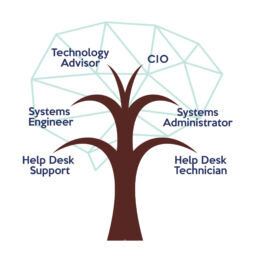In today’s rapidly evolving business landscape, the ability to stay connected seamlessly is more crucial than ever. Wireless networking (WiFi) offers a robust solution, enabling businesses to maintain high levels of efficiency, flexibility, and scalability. By eliminating the need for physical connections, businesses can easily adapt to changing environments, support a mobile workforce, and enhance collaboration among employees. Furthermore, the benefits of a wireless network extend to reduced installation times and costs, providing a significant advantage over traditional wired networks.
Transitioning to a wireless network is about unlocking new operational efficiency and employee productivity potentials. With wireless connectivity, companies can easily connect computers to the internet wirelessly, ensuring that team members have access to critical resources and applications from anywhere within the office.
Why Transition to Wireless Networking?
Transitioning to wireless networking is a strategic move that positions businesses for growth and innovation. A few of the top reasons to make the move include:
- Flexibility and Scalability: Wireless networks offer unparalleled flexibility, allowing businesses to add or remove users and devices without the need for extensive cabling. This scalability is essential for growing businesses that need to adapt quickly.
- Cost Savings: Wireless networks’ initial setup and ongoing maintenance costs are generally lower than those of traditional wired networks. This cost efficiency is particularly appealing for IT for small and mid-sized businesses (SMB).
- Increased Productivity: Employees can stay connected and access resources from anywhere within the coverage area, leading to increased productivity and collaboration.
- Enhanced Guest Experience: Offering an Internal guest network and guest access can significantly enhance the experience of visitors to your business, providing them with easy access to the internet without compromising security.
- Mobility: This enhanced connectivity supports a mobile workforce, enabling employees to work effectively from various locations within the business premises.
- Ease of Installation: Setting up wireless internet connection is typically faster and less disruptive than installing traditional wired networks, minimizing downtime.
- Future-Proofing: Wireless technology continues to evolve rapidly. Adopting it now prepares your business for future technological advancements.
Choosing wireless networking means easier growth and adaptability. It’s an investment in your business’s future, ensuring that you remain competitive in a digital world. In addition, discover the benefits of the top cellular internet backup solutions.
What Sectors of Business Utilize Wireless Networks?
Wireless networks are versatile, supporting a wide range of business sectors with their unique benefits. Some of the sectors that should leverage wireless networks include:
- Retail: Wireless POS systems and inventory management tools help retailers enhance customer service and streamline operations.
- Healthcare: In healthcare, wireless devices enable real-time patient monitoring and data access, improving patient care and operational efficiency.
- Education: Schools and universities leverage wireless networks to support digital learning platforms and resources, facilitating a more interactive and engaging learning experience.
- Hospitality: The hospitality industry uses wireless networks to offer guest internet access, improving guest satisfaction and streamlining operations. Learn about our IT in the entertainment industry and read about our Puttshack Case Study.
- Manufacturing: Wireless technology in manufacturing facilitates real-time monitoring and automation, leading to increased efficiency and productivity.
- Logistics and Transportation: Wireless networks enable real-time tracking and management of shipments and vehicles, improving efficiency and customer service.
- Office Environments: Offices utilize wireless networks to support mobile and flexible working arrangements, enhancing collaboration and productivity.
Across all these sectors, wireless networks drive innovation, efficiency, and customer satisfaction. They are a foundational component of modern business operations, enabling companies to meet the demands of today’s digital world. We also encourage you to explore a few insights on avoiding unpleasant surprises when moving to a new office.
What Devices Can Benefit From Wireless Networking?
Virtually every modern device can benefit from wireless networking, enhancing functionality and user experience. The top examples include:
- Smartphones and Tablets: These devices rely on wireless networks for internet access, app usage, and communication, making them indispensable tools in business operations. This connectivity is particularly important for businesses with employees who are constantly on the go.
- Laptops and Computers: Wireless connectivity allows these devices to access network resources and the internet anywhere within the network’s range, facilitating flexible work environments. A flexible work environment can also help you recruit the top talent on the market.
- Printers and Scanners: Wireless printers and scanners can be accessed by multiple users from different locations, improving office efficiency. You don’t want connectivity issues to slow these devices down.
- IoT Devices: From smart thermostats to security cameras, IoT devices utilize wireless networks to transmit data and receive commands, automating and optimizing various business processes. This type of adaptability and versatility can separate your business from the competition.
- Point of Sale Systems: Wireless POS systems offer flexibility in transactions and inventory management, particularly beneficial in the retail and hospitality sectors. Our team can help you with network connectivity for POS systems.
The integration of these devices into a wireless network streamlines operations, enhances productivity, and offers a level of flexibility that wired networks cannot match. As businesses continue to adopt more technology, the importance of a reliable wireless network setup becomes increasingly critical.
How To Set Up a Business Wireless Network
Setting up a business wireless network involves careful planning and execution to ensure security, coverage, and performance meet the needs of your business. You must make sure you know how to configure wireless network settings properly, as this is crucial for securing your network against unauthorized access and ensuring compatibility with a wide range of devices.
Do not forget that you can reach out to experts who can help you. We would be honored to address these issues and put your business in a position to get the most out of your wireless network. Some of the most important factors to consider include:
Wireless standards
When configuring your network, being familiar with the wireless standards governing wireless communications is vital. These standards, such as 802.11ac and 802.11ax, define wireless networks’ capabilities and performance levels. Choosing the latest standard ensures higher speeds, greater range, and more reliable connections, which are essential for businesses relying heavily on wireless technology. In addition, compatibility with these standards ensures that your network can support a wide range of devices and applications, making it a versatile solution for any business.
Ease of deployment
Ease of deployment is a significant advantage of wireless networks over traditional wired networks. With wireless technology, businesses can avoid the complexities and costs associated with running cables throughout their premises. This speeds up the setup process and offers flexibility to adjust the network layout as the business grows or its needs change. Wireless access points can be strategically placed to maximize coverage and performance. They are easily relocated if necessary.
The process of wireless network setup is streamlined by advanced management tools that allow IT administrators to configure and monitor the network remotely. These tools provide insights into network performance, user activity, and potential security threats, enabling proactive management and troubleshooting. Explore our cloud hosting solutions to enhance your business’s efficiency and flexibility.
Range
The range of a wireless network is a critical consideration, as it determines the area over which the network can provide coverage. To ensure comprehensive coverage, it’s important to choose access points with sufficient range and to place them strategically throughout the business premises. This might involve utilizing additional access points in larger areas or employing range extenders to cover hard-to-reach spots.
However, the range can also be affected by physical obstructions and interference from other wireless devices. Therefore, conducting a thorough site survey before setup can help identify potential issues and inform the placement of access points.
Interference
Interference is a common challenge in wireless networking, with physical barriers, other wireless networks, and electronic devices potentially affecting signal strength and quality. Techniques such as selecting the appropriate channel, adjusting the power settings of access points, and employing advanced technologies like MIMO (Multiple Input Multiple Output) can help overcome interference issues.
Addressing interference effectively ensures that your wireless network delivers consistent performance, supporting critical business applications and communication needs. This is particularly important in environments where multiple wireless networks operate closely, as is often the case in office buildings or business complexes.
Security
Security is paramount in any business wireless network, with cybersecurity measures necessary to protect sensitive data and prevent unauthorized access. Implementing strong encryption, such as WPA3, and regularly updating passwords are basic steps in securing a wireless network. In addition, setting up separate networks for internal internet network usage and guest access can further enhance security by segmenting traffic and minimizing the risk of data breaches.
Regularly monitoring network activity and employing advanced security solutions, such as intrusion detection systems and firewalls, are also crucial for identifying and mitigating potential threats. For comprehensive cybersecurity solutions that protect your business, learn more about network security.
Management
Effective management of a wireless network is essential for ensuring its reliability, performance, and security. Utilizing network management tools allows businesses to oversee all aspects of their wireless network, from user access to network health. These tools provide real-time insights into network performance, enabling IT administrators to identify and resolve issues promptly.
Furthermore, adopting a proactive approach to network management, including regular updates and security audits, can help prevent problems before they impact business operations. Safeguard your network and make the internet more productive for your team with a handful of strategies to make the internet less distracting and protect your network in the future.
Choose Exact IT as your Long-Term IT Partner
At Exact IT, we understand technology’s critical role in driving business success. Our mission is to provide a comprehensive suite of proactive and innovative technology solutions, superior customer support, and exceptional technical consulting to our clients utilizing the knowledge, dependability, and commitment of our team. Understand what needs to be involved in network security, and discover our managed IT services that keep your operations smooth and secure.
Whether you’re looking to set up a small business network or enhance your existing infrastructure, Exact IT offers the knowledge, tools, and support you need to succeed. Reach out to us to learn how we can help you build a wireless network that drives productivity, efficiency, and growth. Contact us today or request a consultation with a member of our team today!
















